
Some time ago I went to a reading given by Herta Müller here in Germany. The first thing that struck me is that she is tiny. Really, really tiny. A waif, a mere wisp of a thing, a leaf that could detach from the branch at the merest shake and then float away on a breeze. And yet, how appearances can deceive. Müller's petite and fragile-seeming exterior conceals great inner strength, a strength that ignites all of her work, and makes her such an important writer and a very worthy winner of this year's Nobel Prize for Literature.
Much has been written about Herta Müller since the announcement of the award, with most commentators confessing ignorance, not having read her work or, in some cases, not even having heard of her. By now, most will be aware that Müller was born in a German-speaking enclave of Romania, her position as an outsider in society already programmed by circumstance of birth. She soon landed in hot water in this shady, scary land. In the 1970s she worked as a translator in a factory until she refused to cooperate with the secret services. As a result, she lost her job, was denounced as a spy, was threatened, beaten and interrogated time and again, and was attacked on the street. (I strongly recommend this extraordinary account, written by Herta Müller herself and published in a German newspaper in July of this year). Yet for Müller, there was never a question that she would comply. Here we see her strength, a strength that she managed to transform into words.
Herta Müller has always used language to rail against violence and dictatorship in her books; and in her work, poetry and prose positively melt into each other. The simplest things take on a new dimension. So, what should one read? Well, publishers are now scrambling to release or re-release English translations of her work, and many of her other books will probably appear much later, but I would suggest reading whatever you can get your hands on, be they earlier works, such as Nadirs, or The Passport, which portray a village life that is seemingly simple, but filled with a dark repression of its own, or later works such as The Land of Green Plums, about a group of young people that pays dearly for its opposition to the Ceausescu-Regime, or The Appointment, both of which are claustrophobic in their descriptions of the insidious brutality of a fear-inducing regime. Or indeed, should they ever be translated, her essays, in which she ponders the political and historical conditions of the writing process.
In her latest book, Everything I Possess I Carry With Me, Müller continues in this impressive vein, this time going further back in time and producing a breathtaking and powerful novel in the process. It concerns the deportation of ethnic Germans in Romania to Soviet labour camps after the Second World War, and the consequences for those who came after. This is a book that comes from a very private place: Müller's own mother was deported, like many of her generation. The young Herta learned what was happening through snatched fragments of overheard speech. It is also a very personal book in another sense: the author conducted numerous interviews with survivors, and held intense and intimate conversations with her good friend, the renowned poet Oskar Pastior, who died suddenly before the book could be completed. It is his first-hand experience of internment in present-day Ukraine that forms the basis of the book. As ever, Herta Müller confronts the existential matters of life, made all the more existential in the context of political incarceration, addressing questions such as: When does vanity cease to be important? Was there a mirror in the camp? Does one want to see oneself at all?
Holding up a mirror to society is arguably one of the most important functions of a writer, and it is a talent that all great writers have in common. It is all the more vital—not to mention dangerous—when that society is repressive and brutal. The fate of literature in a dictatorship is to take on and absorb all of the things that are otherwise not allowed. In a society in which freedom of expression is non-existent, in which all forms of media is censored, where the law has been perverted and every private action and utterance is monitored, literature takes on the mantle of opposition and free expression and, in doing so, manages to subvert and control a small part of society itself, and to provide an anchor for those adrift in it. This is why literature is feared by repressive regimes and it is what makes Herta Müller so very important. She breaks the silence into which so many have fled.
The yearly chatter about the Nobel Prize can get tiresome, with all those clamours for the merits of hoary old North Americans. Frankly, I'm glad that the honour still hasn't gone to a writer who has spent his life examining the proclivities of the young male sexual beast, the middle-aged male sexual beast and the elderly male sexual beast (yes, I'm looking at you, Mr. Roth). And while I join others in wishing for more attention being paid to African and Asian and South American writers (and while I think that competitions to determine literary worth are somehow ridiculous), I'm simply thrilled about this result.
Herta Müller never ceases to battle against misery and oppression, against terror and the destruction of human dignity and, above all, against forgetting. How does she do this? In a language that is heartrending and aesthetic, expressive and full of imagery. Herta Müller's prose may not be to everyone's taste—repetition is a favoured poetic device, some sentences can seem stark, and I've yet to be convinced of the faithfulness of the translations into English thus far—but there is no denying that her writing, filled with dream-like snatches of memory and a desolation laced with irony, is worthy of this prize. And bad cess to those that moan about this being merely a politically-correct decision: In the face of repression, Herta Müller never allowed herself to stop writing. And, in serving the cause of human dignity while doing so, she most certainly deserves this great literary honour.
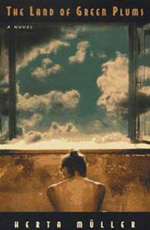 Univ. of Nebraska, paperback, 9780810115972
Univ. of Nebraska, paperback, 9780810115972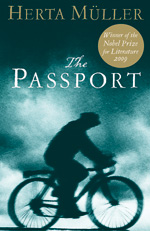 Serpent's Tail, paperback, 9781852421397
Serpent's Tail, paperback, 9781852421397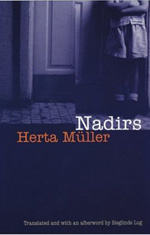 Univ. of Nebraska, paperback, 9780803282544
Univ. of Nebraska, paperback, 9780803282544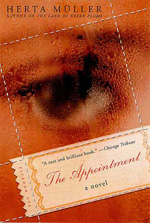 Picador, paperback, 9780312420543
Picador, paperback, 9780312420543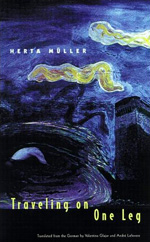 Northwestern Univ. Press, hardcover, 9780810116412
Northwestern Univ. Press, hardcover, 9780810116412